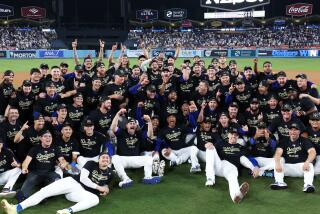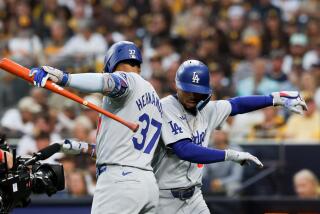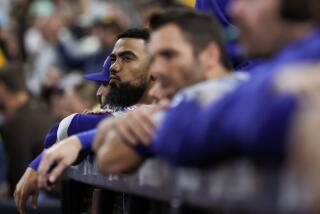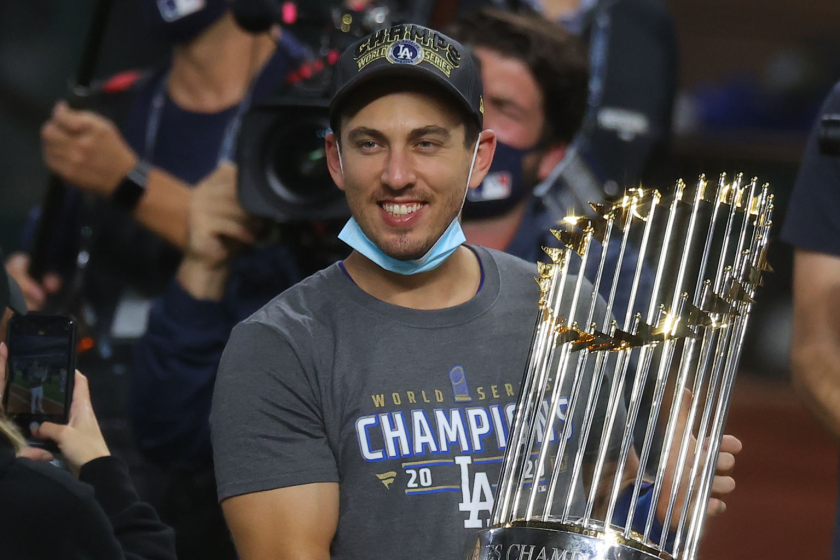Hurst Handles Dodgers : Gibson Strikeout Helps Slam Door on 2-0 Victory
- Share via
SAN DIEGO — The eighth-inning confrontation between Kirk Gibson and Bruce Hurst was between more than a multimillion-dollar hitter and multimillion-dollar pitcher.
This was between former American League East rivals from old, gritty cities, rivals who had come west to make a fresh start in a new league. They had faced each before and they knew each other well.
They squared off Tuesday night for the first time in their new surroundings with a game in the balance, and the tension was as dramatic as the result.
Hurst retired Gibson on a called third strike to end a Dodger threat and preserve a 2-0 Padre victory in front of 25,746 at San Diego Jack Murphy Stadium.
“It was a great pitch,” Gibson said. “There is not a person on the face of the Earth who would not be surprised by that pitch.”
The pitch was a curveball, the first and only one Hurst threw to Gibson in four at-bats. It was a pitch Hurst said he had used successfully against Gibson when Gibson was in his early days in Detroit, and Hurst was starting out in Boston.
But it was a pitch he said he seldom used against Gibson anymore. Hurst said Gibson had wised up and learned how to hit his curve. So Hurst saved it until he needed it most--full count, two out, runners on first and third and the Padres leading, 2-0.
“I hadn’t thrown him a breaking ball all day long,” Hurst said. “I figured it was now or never.”
The strikeout ended a battle of wits and nerves that began after Hurst allowed his only extra-base hit--a two-out double to Jose Gonzalez.
Willie Randolph followed with an infield single on a grounder that shortstop Garry Templeton was hard pressed to prevent from going into left field and possibly scoring Gonzalez.
Up stepped Gibson, a .346 hitter against Hurst as a Tiger. Hurst started Gibson with three balls before he answered with three called strikes--the last on a curveball that had Gibson pulling back slightly from the plate.
The strikeout was Hurst’s sixth and last of the game.
“To me that was the game,” Padre pitching coach Pat Dobson said. “It came down to a three-two curveball. And that was the pitch he didn’t expect.”
Hurst’s troubles were not over; he had to pitch out of another two-out jam in the ninth.
Mickey Hatcher singled and went to third when third baseman Luis Salazar let Rick Dempsey’s grounder get down the left-field line for a two-base error. But Hurst retired Alfredo Griffin on a fly to right to end the game.
The shutout was Hurst’s first in the National League and his first since Aug. 7, when he defeated Detroit, 3-0, while a member of the Red Sox. It extended Hurst’s streak of scoreless innings to 19 over two games.
The complete game was his third as a Padre, his first since a 3-1 victory at Pittsburgh April 26. But the victory was Hurst’s first in four starts, since a 1-0 decision over Philadelphia May 29. That was the midpoint of a seven-game stretch in which Hurst also lost three times and had three no-decisions.
Hurst pitched well in most of the games. In the seven games, he allowed 14 earned runs in 48 2/3 innings for a 2.59 ERA. Only once, when he gave up six earned runs in the first five innings of a 12-2 loss at San Francisco June 9, did Hurst allow more than three earned runs in any of those starts.
The problem was lack of support. The Padres scored 17 runs in those seven games, an average of 2.4 runs per game. Those troubles reached their zenith Thursday against Cincinnati when Hurst left for a pinch-hitter in the 11th inning of a scoreless tie. The Padres won, 1-0, in the 12th, but Hurst did not figure in the decision.
The Padres did not offer much more support this time, but what they did provide was enough on a night when Hurst was at his best.
The Padres took a 1-0 lead in the third. Tony Gwynn led off with a walk and moved to second on Jack Clark’s groundout to shortstop. Marvell Wynne popped out to first, but Templeton came through with a double to right, scoring Gwynn, and he took third when Hatcher dropped the ball for the an error. He was left stranded when Benito Santiago grounded to shortstop.
The Padres added a run in the fourth for a 2-0 lead off starter Tim Belcher. Salazar opened with a single, and Shawn Abner walked with one out. Belcher’s wild pitch advanced the runners to second and third before Salazar came home on Roberto Alomar’s sacrifice fly to left.
That was enough to chase Belcher, who left for a pinch-hitter in the fifth and was replaced by John Wetteland. Belcher (4-6) took the loss, his fourth in his past five starts.
The Padres had other chances against Belcher but fell victim to some old bad habits.
They loaded the bases with one out in the first on a single by Alomar and walks to Gwynn and Clark. But they came away empty as Wynne fouled out and Templeton struck out.
A similar scene was repeated in the second inning when Salazar singled with one out and, after Hurst struck out attempting a sacrifice bunt, Abner singled to put runners at first and third.
That scoring chance was wasted, too, when Alomar flew out to center to end the inning.
It was another example of the Padres’ inability to take advantage of early opportunities--two innings, no runs, five left on base.
And while they would go on to leave a total of eight runners stranded, they scored enough to win.
“We did some things well when we had to,” Padre Manager Jack McKeon said. “Maybe our luck is about to change.”
Padre Notes
Tony Gwynn took over as the leading hitter in the National League this week, but do not expect him to do a lot of box score watching--at least not yet. “It’s too early,” Gwynn said. “I don’t worry about that until September. Too many things can happen between now and then.” Gwynn entered the game with a .358 average, just ahead of second-place Barry Larkin (.355) of Cincinnati. Gwynn has been on a hot streak, batting .474 (36 for 76) in 20 games before Tuesday night’s game against the Dodgers. While Gwynn is hitting, his base-stealing has fallen off of late. On May 25, Gwynn stole his 19th base to lead the National League. He went 21 games until his next stolen base Saturday against Houston and entered Tuesday night’s game with 21, third in the league. Gwynn said he has curtailed his running at the request of Manager Jack McKeon. “I was taking too many chances,” said Gwynn, who has been caught stealing eight times. “I still have a green light, but now it’s a shaded green light. I have to be more selective. I have to go when the time is right.”
Today’s starting pitcher, Ed Whitson, will be out to break a two-game losing streak after having won a personal-best seven in a row. The Padres, who scored 50 runs for Whitson in eight starts (seven victories, one no-decision), have scored a total of one in the two losses. . . . Andy Benes, the first player selected in the 1988 amateur free-agent draft, remains on the disabled list at double-A Wichita with tendinitis in his pitching arm. He was placed on the seven-day disabled list June 9, but no date has been set for his return. . . . Ray McDavid, the outfielder from Clairemont High School who was drafted by the Padres during the amateur free-agent draft June 5-7, has not signed a contract but has agreed to terms, director of scouting Randy Smith said. After McDavid signs, he will be assigned to the Padres’ Scottsdale team in the Arizona Rookie League. The Padres other San Diego County selection, left-handed pitcher Scott Vonderleith, has not agreed to terms. Vonderleith has attended Mesa College and Mission Bay High School.
More to Read
Are you a true-blue fan?
Get our Dodgers Dugout newsletter for insights, news and much more.
You may occasionally receive promotional content from the Los Angeles Times.










